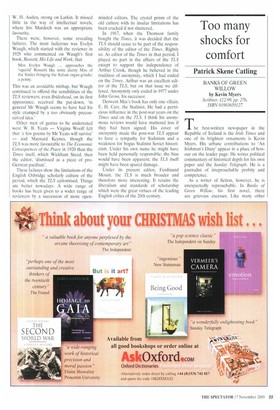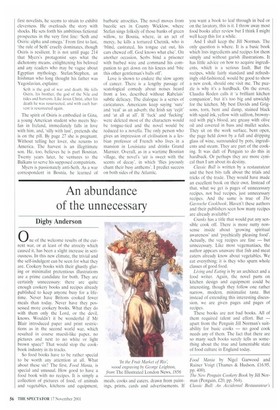Too many shocks for comfort
Patrick Skene Catling
BANKS OF GREEN WILLOW by Kevin Myers Scribner, £12.99, pp. 276, ISBN 01903650127 The best-written newspaper in the Republic of Ireland is the Irish Times and one of its brightest ornaments is Kevin Myers. His urbane contributions to 'An Irishman's Diary' appear in a place of honour on the leader page. He writes political commentary of historical depth for his own paper and the Sunday Telegraph. He is a journalist of irreproachable probity and competence.
As a writer of fiction, however, he is unexpectedly reproachable. In Banks of Green Willow, his first novel, there are grievous excesses. Like many other
first novelists, he seems to strain to exhibit cleverness. He overloads the story with shocks. He sets forth his ambitious fictional prospectus in the very first line: 'Seth and Osiris: alpha and omega.' From first to last, the rule of Seth' cruelly dominates, though Osiris is resilient. It is not until page 214 that Myers's protagonist says what the dichotomy means, enlightening his beloved and any readers who may be vague about Egyptian mythology. Stefan/Stephen, an Irishman who long thought his father was Yugoslavian, explains:
Seth is the god of war and death. He kills Osiris, his brother, the god of the Nile and tides and harvests. Like Jesus Christ, after his death he was resurrected, and with each harvest is resurrected again.
The spirit of Osiris is embodied in Gina, a young American student who meets Stefan in Ireland, immediately falls in love with him, and, 'silly with lust', pretends she is on the pill. By page 27 she is pregnant. Without telling her lover, she returns to America. The harvest is an illegitimate son. He, too, believes he is part Bosnian. Twenty years later, he ventures to the Balkans to serve his supposed compatriots.
Myers is passionately anti-Seth. As a war correspondent in Bosnia. he learned of barbaric atrocities. The novel moves from bucolic sex in County Wicklow. where Stefan sings folksily of those banks of green willow, to Bosnia, where, in an act of mercy, he kills a tortured Chetnik, who is 'blind, castrated, his tongue cut out, his ears chewed off. God knows what else'. On another occasion, Serbs bind a prisoner with barbed wire and command his companion to get down on his knees and 'bite this other gentleman's balls off'.
Love is shown to endure the slow agony of cancer. There is a lengthy passage of scatological comedy about noises heard from a loo, described without Rabelais' subtle delicacy. The dialogue is a series of caricatures. Americans keep saying 'sure' and 'real' as an adverb; the Irish say `eejit' and 'at all at all'. If 'fuck' and 'fucking' were deleted most of the characters would be tongue-tied and the novel would be reduced to a novella. The only person who gives an impression of civilisation is a lesbian professor of French who lives in a mansion in Louisiana and drinks Grand Marnier. Overall, as in a wartime Bosnian village, the novel's 'air is sweet with the scents of decay', in which 'flies joyously chant their busy anthems'. I predict success on both sides of the Atlantic. you want a book to leaf through in bed or on the lavatory, this is it. I throw away most food books after review but I think I might well keep this for a while.
And I shall keep the Jill Norman. The only question is where. It is a basic book which lists ingredients and recipes for them simply and without garish illustrations. It has little advice on how to acquire ingredients, which is a serious fault. But the recipes, while fairly standard and refreshingly old-fashioned, would be good to show a new cook, should one visit me. The puzzle is why it's a hardback. On the cover, Claudia Roden calls it 'a brilliant kitchen companion', but it's too big and unwieldy for the kitchen. My best Davids and Grigsons, torn, bent and damp, stained black with squid ink, yellow with saffron, brownyred with pig's blood, are greasy with olive oil and covered in bass and mullet scales. They sit on the work surface, bent open, the page held down by a full and dripping glass of wine, surrounded by pots, ingredients and steam. They are part of the cooking. It was daft of Penguin to do this in hardback. Or perhaps they are more cynical than I am about its destiny.
Classic Bull is written by a restaurateur and the best bits talk about the trials and tricks of the trade, They would have made an excellent book on their own. Instead of that, what we get is pages of unnecessary recipes, not bad recipes, just unnecessary recipes. And the same is true of The Gavroche Cookbook. Haven't these authors and their publishers seen how many recipes are already available?
Cranks has a title that would put any sensible cook off. There is more nutty nonsense inside about 'growing spiritual awareness' and 'psychically pleasing food'. Actually, the veg recipes are fine — but unnecessary. Like most vegemaniacs, the author appears unaware that fish and meat eaters already know about vegetables. We eat everything; it is they who spurn whole classes of good food.
Living and Eating is by an architect and a food writer. Again, the novel parts on kitchen design and equipment could be interesting, though they follow one rather narrow, modern, minimalist taste. But instead of extending this interesting discussion, we are given pages and pages of recipes.
These books are not bad books. All of them required talent and effort. But — apart from the Penguin Jill Norman's suitability for basic cooks — no good cook needs any of them. The fact that there are so many such books surely tells us something about the true and lamentable state of food culture in England today.
Food Mania by Nigel Garwood and Rainer Voigt (Thames & Hudson, £16.95, pp. 400).
The New Penguin Cookery Book by Jill Norman (Penguin, £20, pp. 564).
Classic Bull: An Accidental Restaurateur's























































































 Previous page
Previous page